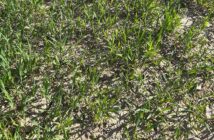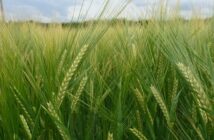It’s decision time for grass weed control. With wheat crops coming out of winter, now is the time to assess the weed situation and put the next phase of the herbicide plan into action.
Both black-grass and rye-grass are tough opponents; defeating them is a battle of attrition – cultural controls, delayed drilling followed by residual herbicides then a post-emergence spray can eventually tip the balance in the crops farmers so what should farmers consider before starting up the sprayer this spring.
“Decision one is does the crop need a post-emergence spray,” says Dr Gordon Anderson-Taylor of Bayer. “In most cases, where the target is present there will be a benefit from a post-em treatment – particularly if the weeds are at small growth stages.”
In situations where crops are looking quite clean after the autumn programme, there may be a temptation to rule out the post-em treatment, but this is the wrong approach according to Dr Anderson-Taylor.
“If you’ve had a good autumn, spring is the time to press home your advantage and destroy as many plants as possible. Every plant you eliminate now is perhaps a several hundred fewer seeds to control next season. Long-term, you need to think about managing populations – reducing plant numbers at every opportunity.”
What you treat the plants with is the next question. Atlantis WG (mesosulfuron + iodosulfuron) has been the benchmark for black-grass and rye-grass control for many years and this season is joined by its younger sibling Hamlet (mesosulfuron + iodosulfuron + diflufenican).
“During our trials of Hamlet, we saw around 10% more black-grass control from Hamlet during the autumn and winter months,” says Dr Anderson Taylor. “The improvement in control is typically only seen during the earlier stages of the season. So, once crops wake up for spring and begin active growth – generally after the end of February – Atlantis provides a better a better balance between weed control while managing the risk of phytotoxicity.
Good application technique will always improve results, Both Hamlet and Atlantis WG need to land on a dry leaf and stay there to be taken in by the plant. Using biopower as an adjuvant increases the staying power of the herbicide. Use a fine-medium spray with a flat fan nozzle works while spraying at a speed of no more than 12Km/h to avoid drift.




